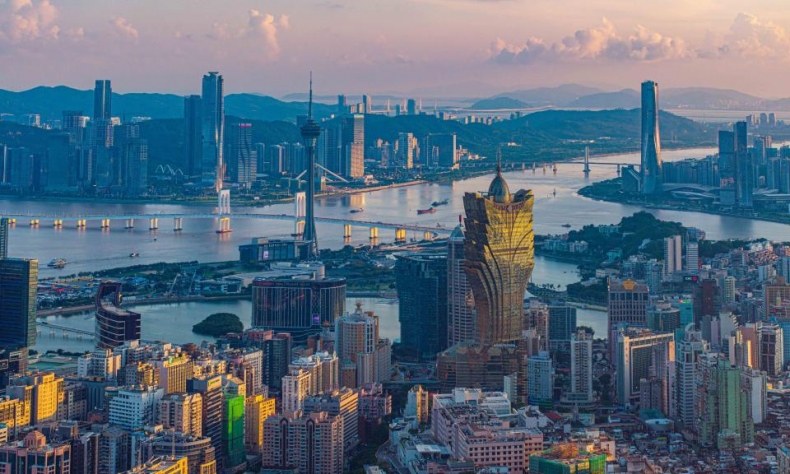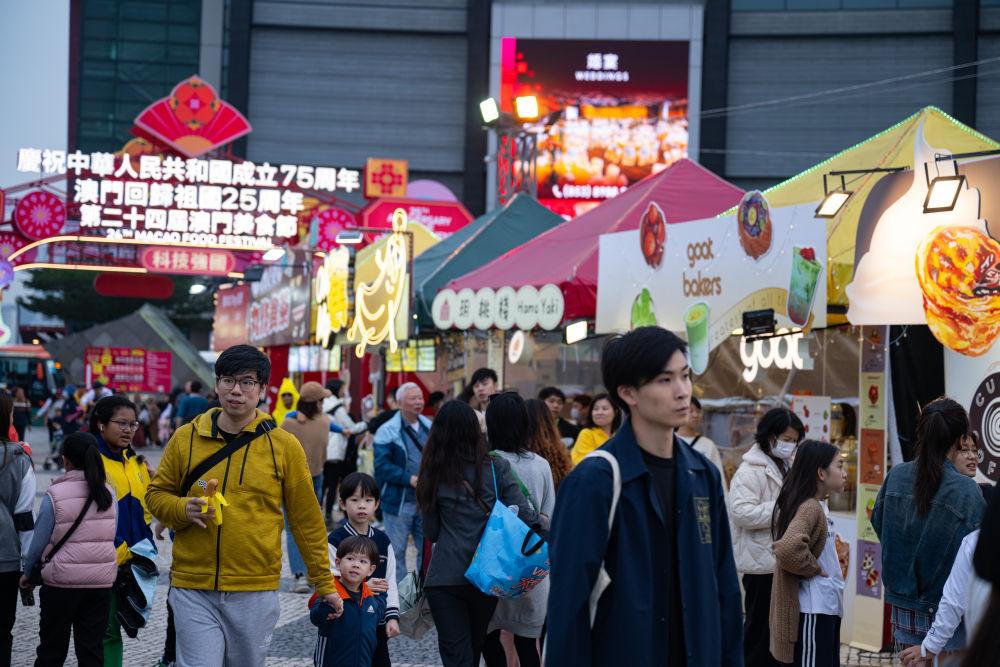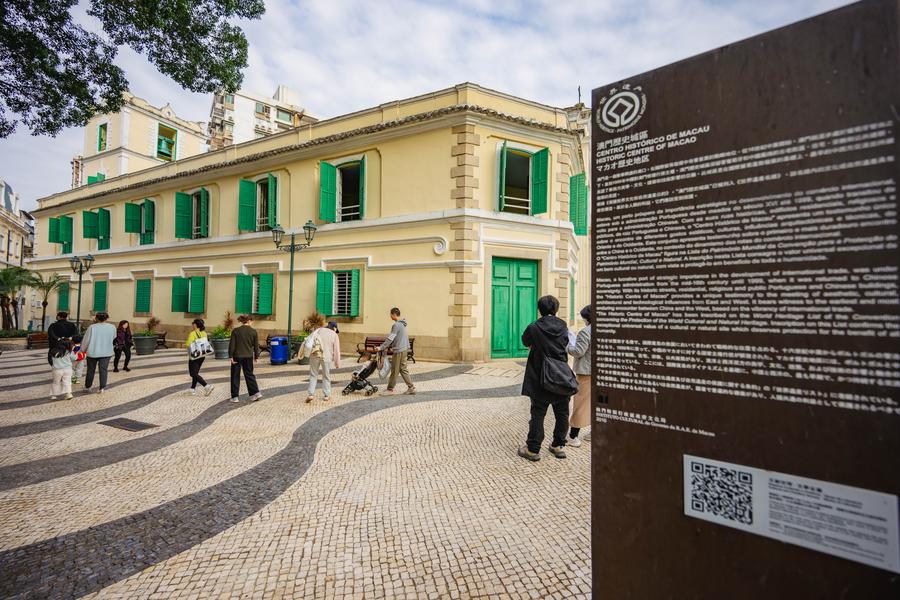A Close Look at Macao’s Development from 1999 to 2024

Macao’s development over the past 25 years has demonstrated that the principle of ‘one country, two systems’ is fully applicable, achievable, and popular.
Fu Tang Long, a prominent figure in the live-commerce—a combination of livestreaming and e-commerce—scene in Macao Special Administrative Region (SAR) in south China, has achieved remarkable success online. In the past year, over $16 million worth of goods have been sold through his livestreaming programs in the region.
Fu is now president of the Macao Digital Industry Research Institute and executive vice president of the Macao Live Streaming Association, and his journey has been one of resilience and determination.
In 2014, at the age of 26, he turned down a secure civil service job in Macao to pursue entrepreneurship on the Chinese mainland. It was a bold decision. Back then, Macao’s youth had limited options for jobs that offered security, steady income and clear career paths. Often, it was a choice between becoming a casino dealer and securing a civil servant role. Recognizing the potential in emerging industries like e-commerce on the mainland, Fu ventured into the unknown.
Mutual exchanges
Overcoming setbacks and challenges, Fu eventually became a top seller on one of the mainland’s popular e-commerce platforms. In 2019, the Central Government unveiled a development plan for the Guangdong-Hong Kong-Macao Greater Bay Area, aiming to build the area into one of China’s international innovation and technology hubs and a quality place for living, working and traveling. Fu seized the opportunity to return home and contribute to the region’s growth.
By offering free training in new media and livestreaming e-commerce, he empowered many young people in Macao to explore new opportunities in the digital economy. Through his programs, Fu has supported over 350 small and medium-sized enterprises by training nearly 4,000 young individuals in digital marketing and livestreaming, many of whom have gone on to launch successful online stores.
Looking ahead, Fu is optimistic about Macao’s role in the global economy. “Macao is small, but the stage is vast,” he told Xinhua News Agency. “We sit at the crossroads of the mainland, Europe and Latin America. The path ahead for our youth is no longer uncertain. It is full of exciting possibilities.”
Fu’s story is a microcosm of Macao’s younger generations. Since its return to the motherland on December 20, 1999, Macao’s exchanges with the mainland have greatly increased. The Central Government has continuously implemented policies to facilitate talent exchange in various fields such as technology, education, healthcare and culture.
Lei Weng Iek, after participating in an exchange program between Macao and the mainland in 2009, got the idea to go work in Shanghai. In 2020, after years of experience in the IT industry, Lei and his classmates pooled their first startup capital to open a small distillery in Shanghai, which gradually gained popularity in the surrounding neighborhoods.
Last year, they opened a Macao-themed restaurant in the city center and plan to open a Macao-themed bakery in Shanghai next year. Currently, the distillery is developing a new beverage flavor to celebrate the 25th anniversary of Macao’s return to the motherland. Lei envisions expanding into a chain of restaurants, centered in Shanghai and branching out to other cities, focusing on offering diners a “Taste of Macao.”

This November, the Shanghai Macao Friendship Association was established, with Lei and others being among the first Macao entrepreneurs in Shanghai to join. “I believe that the vast Shanghai market and the city’s business-friendly environment are conducive to the growth of startups,” he told Xinhua, revealing that in different cities on the mainland, young people from Macao are eligible to receive different forms of support, from recommending entrepreneurial projects to providing funding assistance and ongoing support and guidance. In their view, the relationship between Macao and the mainland is becoming increasingly close.
Over the past quarter-century, Macao has undergone significant development. According to China Central Television (CCTV), in 1999, Macao’s land area was only 21.45 square km. Since then, the Central Government has approved multiple land reclamation projects in Macao, increasing its land area to 33.3 square km. From 1999 to 2023, Macao’s per-capita GDP increased from $15,000 to $69,000, and the unemployment rate decreased from 6.3 percent to 2.7 percent.
“Macao has achieved new progress in diversifying its economy, as the share of the gaming industry in its overall GDP decreased to 37.2 in 2023, 14 percent down from that in 2019,” said Ho Iat Seng, Chief Executive of Macao SAR.
“The growing share of key non-gaming industries in Macao’s economy over the past years is enhancing its stability and resilience,” Ho told Xinhua.
The share of the budget allocated to essential sectors such as education, healthcare, social security, housing and community services has risen from 39.2 percent in 2019 to 44.8 percent in 2024.
Given Macao’s small population and limited land area, the region faces natural constraints, Ho noted, stressing the importance of integrating Macao more closely into broader national development strategies. “Macao’s development over the past 25 years has demonstrated that the principle of ‘one country, two systems’ is fully applicable, achievable, and popular,” Ho said.
A new hub
Aiming to become a hub for sports and entertainment, Macao has hosted an increasing number of sporting events, including international table tennis events like the ITTF World Cup and WTT Macao Championships. These events have become shining examples of Macao’s athletic scene.
Today, Macao hosts at least two international events every month, featuring unique sports occasions with Macao characteristics to attract visitors from all over. In the realm of cultural performances, occasions such as the Macao International Parade, the Macao Arts Festival, the Arts and Cultural Festival Between China and Portuguese-Speaking Countries, and a growing number of concerts are turning Macao into a hub for cultural exchange.
Figures from the Macao SAR Government show that in 2023 alone, nearly 20 million people participated in arts and cultural activities in the region, with large-scale concerts and events together drawing about 1 million attendees and generating around MOP1.1 billion ($700 million) in ticket sales.
The Historic Center of Macao, a UNESCO World Heritage Site since 2005, stands as a symbol of the city’s rich history and cultural heritage. From its origins as a bustling port for maritime trade to its current status as a vibrant blend of Eastern and Western cultures, the center has evolved into a must-visit tourist destination in the diverse SAR.
“There have been noticeable changes in tourists’ preference in Macao, with a growing emphasis on culture,” a tourist surnamed Han from the mainland, told China Today magazine. During his time in Macao in October, he visited the Yilong Firecracker Factory.

The factory has been sitting idle for many years after ceasing production in 1984. In 2022, the former site of the Yilong Firecracker Factory was renovated, preserving the original production facilities while incorporating new cultural elements. This attracted many tourists. “Strolling through this place feels like exploring the historical stories of Macao’s craftsmanship—truly captivating,” Han said.
With a population exceeding 700,000, Macao has seen a substantial rise in inbound visitors over the years, welcoming tens of millions of tourists annually. From approximately 7.44 million inbound tourists in 1999 to over 28 million in 2023, Macao’s appeal as a tourist destination continues to grow.
Backed by the Central Government’s authorization and support, Macao has forged stable economic, trade, and cultural relationships with over 120 countries and regions. The SAR’s participation in international organizations and institutions has expanded to over 190, and Macao SAR passport holders now enjoy visa-free or visa-on-arrival access to 148 countries and regions. This global engagement further solidifies Macao’s position as a key player on the international stage.
A catalyst for development
When discussing the development of Macao, one cannot overlook Hengqin Island. Spanning over 100 square km, Hengqin is located at the estuary of the Pearl River, within Zhuhai City in Guangdong Province, and is only 187 meters away from the main island of Macao. Its strategic location makes it an ideal bridge connecting the mainland with the SAR.
In September 2021, the Guangdong-Macao In-Depth Cooperation Zone was established in Hengqin. According to the plan, the zone, three times the size of Macao, will serve as a new platform for Macao to diversify its economy and provide a new home for its residents to work and live in.
Since its inception, the number of Macao-invested enterprises and their industrial output in the cooperation zone has notably increased, leading to rapid integration between Hengqin and Macao. Macao residents residing in Hengqin on or after March 1 last year are considered to be living in Macao as far as social securities are concerned. Legal practitioners and lawyers from Hong Kong and Macao are permitted to open law firms on the island.
As of late 2023, the number of Macao-registered enterprises in the zone had reached 6,000, an 11-percent year-on-year increase, while total registered funds amounted to 166 billion yuan ($23 billion). By the end of this year, approximately 20,000 residents of Macao are expected to be living in the Guangdong-Macao In-Depth Cooperation Zone in Hengqin, with an estimated 5,000 working there.
Zhang Qianjun, who grew up in a family of traditional Chinese medicine practitioners in Macao, opened her clinic in the region in 2013. In 2021, she became one of the first doctors from Macao to practice in Hengqin.
“After years of practicing medicine in Macao, I felt left behind by technological development and yearned for new challenges,” Zhang told Guangdong Daily. Practicing at a hospital in Hengqin allows her to treat patients from various regions with diverse lifestyles and health habits, gaining more experience in diagnoses.
Hengqin has also implemented measures to promote the transfer and industrialization of scientific and technological achievements from universities. The establishment of demonstration bases for industry-academia-research collaboration involving the University of Macao, Macao University of Science and Technology, and four national key laboratories in Hengqin has facilitated the conversion and industrialization of university scientific and technological achievements.
Li Weinong, Director of the Executive Committee of the Guangdong-Macao In-Depth Cooperation Zone in Hengqin revealed that, as of November this year, Hengqin had incubated 898 entrepreneurship projects for young people from Hong Kong and Macao, with 815 projects from Macao.
“By 2035, Hengqin is expected to become a powerful growth engine for the Guangzhou-Zhuhai-Macao science and technology innovation corridor, contributing to the diversification of Macao’s economy,” he told Xinhua.
 Facebook
Facebook
 Twitter
Twitter
 Linkedin
Linkedin
 Google +
Google +










